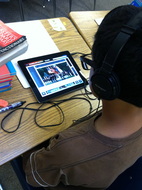|
One of the most persistent reasons that I hear for why some teachers choose NOT to implement mobile technology is that whatever task they are asking students to do can be done using more traditional methods. As one colleague casually mentioned to me recently, “The iPad isn’t offering anything that I can’t have my students do using a pencil and paper.”  While my immediate impulse was to counter this comment with a dozen different arguments for why mobile technology is an incredible classroom tool, I realized that I wasn’t talking to someone who is living in the teaching dark ages. More often than not, the teachers who have made such remarks to me are actually pretty adept at using technology for instructional purposes in their classroom. They are often dynamic, engaging individuals with a charisma that students find irresistible. For all intents and purposes, these teachers are on the top of their game. The fact that their technology integration is teacher-centered seems to be something they simply aren’t all that concerned about. I think, underlying it all, is an adherence to the age-old philosophy that says, “If it ain’t broke, don’t fix it.” On the surface, it’s tough to argue that these teachers should change the way they teach. They are already making an impact, engaging students, and imparting knowledge. These teachers are good at their jobs – probably excellent. However, the real issue isn’t whether teachers are successful at teaching, but rather if their students will be successful at whatever it is they want to do in life. When we integrate technology in the classroom and keep it student-centered, there are some powerful byproducts of learning that can’t be overlooked: 1. Information and Media Literacy. As the nation shifts toward Common Core standards, the instruction students receive will shift more toward building information literacy. With a plethora of sources available to them on the Internet, students need to be able to search effectively, discern credibility, and synthesize information. This is a “life skill” that can only be developed in students who are exposed to and interact with multiple sources in an Internet-based, media rich environment. Students need to be able to communicate in a variety of ways because our world grows more and more digitized each year. Can they express their point of view in a multimedia presentation? On film? In a podcast? By writing a persuasive blog post? Can they conduct a survey online, or collaborate with peers using cloud-based software? 2. Critical Thinking and Innovation. If we are supposed to train students to think deeply, ask the hard questions, explore to find solutions, and evaluate the opinions of others, then how can we do that if we only ever give our students the opportunity to think inside of a box that we build? 3. Engagement and Experience. Even if 90% of your classroom is engaged 90% of the time, there is an opportunity for improvement. Boost engagement to 100% and give students the option to learn, grow, discover, and create in the medium most natural to them – technology. We are teaching digital natives and we need to meet them on their own turf. Yes, technology will continue to change and grow, and in a few years we will probably have something even better than the iPad, but should we stop adapting our instruction in anticipation of the next big device? Should we stop investing money in educational technology to put in the hands of students because it will eventually become outdated? Of course not. Relevant experience builds on itself. During the last school year some of my students had never used an iPad before, but they had used a friend’s iPhone or iPod, so it wasn’t a big leap for them to make to use an iPad. Those leaps won’t be possible if we never invest in anything. In the end, the instructional decisions we make as teachers need to be based on what kind of people we are shaping students to become, not on whether the way we teach still works. Cross-posted on www.appsinclass.com
0 Comments
Your comment will be posted after it is approved.
Leave a Reply. |
Author: Jessica PackCalifornia Teacher of the Year. CUE Outstanding Educator 2015. DIGICOM Learning Teacher Consultant. 6th Grade Teacher. Passionate about gamification, Minecraft, digital story-telling, and fostering student voices. Download:Archives
June 2020
Categories
All
|

 RSS Feed
RSS Feed